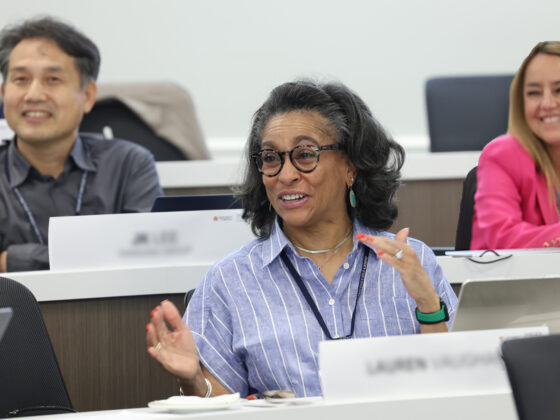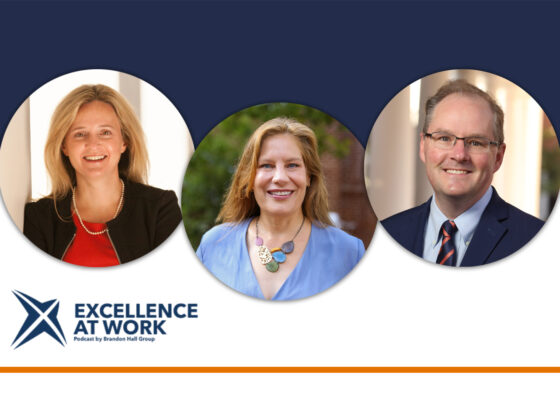Darden Executive Education & Lifelong Learning CEO and Chief Learning Officer Ashley Williams came to Darden in early 2019 from McKinsey & Co., where the graduate of the UVA McIntire School of Commerce worked for two decades, eventually rising to the position of global chief learning officer for the consulting firm’s McKinsey Academy. At McKinsey, Williams helped organizations and leaders figure out how to harness the trends influencing the workplace to accelerate transformations. At Darden, Williams’ charge is similar: to position Darden Executive Education & Lifelong Learning as the provider of choice for organizations and individuals navigating the workplace in an age in which sophisticated digital skills are prized, yet a host of traditional managerial competencies and core skills remain critical.
Williams recently spoke about the future of work, what it means to continuously upskill as a lifelong learner and the impact of the new Sands Institute for Lifelong Learning at Darden, which will fuel innovation for teaching lifelong learners in degree and non-degree programs.
How is Darden Executive Education thinking about preparing business leaders for the future?
One question we have to ask is: Do we really understand what the future of work looks like? What are the skills required for it, what will be different and what will be the same? And what does that mean for our portfolio of programs in support of the success of individuals and companies?
We recently discussed an initial view on Darden’s strategy for Executive Education and Lifelong Learning with the School’s faculty and the Darden School Foundation Board of Trustees. Central to the strategy is ensuring that Darden brings a market-backed and faculty forward set of offerings, meaning that we are grounded in the emerging leadership skills of the future, and bring distinctive perspectives, both new and evergreen, from our faculty.
During my time at McKinsey, I was immersed in the growing body of thinking on the future of work and helped to convene the Consortium for the Advancement of Adult Learning and Development, which brought together academics, practitioners, ed-tech leaders and nonprofits. We grappled with the central question of how to unlock the power of the ecosystem to support thriving in this new world. Members of the Darden faculty are also grappling with these issues, such as Professor Ed Hess, whose recent work rethinks human excellence in the smart machine age, and Professor Raj Venkatesan, whose research examines the power of big data and artificial intelligence in marketing.
There are many reports that speak to what skills and capabilities are needed in the face of change relative to automation, robotics, technology, etc. There is growing agreement that one aspect of the future of work will be the increased importance — or resurgence — of what you would historically think of as core skills for leaders. Those core skills will have to extend from the C-suite to the frontline.
What sorts of core skills?
Skills like problem-solving, decision-making and agile decision-making in increasingly shifting environments. We are seeing a rise in need for acutely human skills like effective communication, empathy and relationship building. With the rise of automation, robots and AI, these core human skills become even more important, at all levels.
Even if robots take over some core decisions, the reality is you still have to be able to translate the ideas and make effective decisions across the organization — and those decisions will be made by humans.
How do you think about new digital skills to complement those core skills?
Undoubtedly, there is a surge in need for digital literacy; everyone in the organization needs some level of digital fluency. What is unclear is what digital literacy really means.
When one person says digital literacy to another, they can be talking about very different things, especially as it pertains to different roles. Sometimes, digital literacy is reduced to a conversation about coding, and I think that’s a shame. Coding is a necessary but insufficient part of the digital ecosystem leaders will need to manage to be effective.
In executive education, when we talk about the need for digital literacy, we are not talking about teaching everyone to code or even to have deep data and analytics skills. What we need to do is help managers and leaders figure out how to infuse digital literacy across functions in organizations — marketing, strategy, HR, finance, etc. We need to ask what digital and analytical literacy mean for all the different functions. And how do you, as a leader, integrate the digital ecosystem into the decision-making and strategy setting for your organization? It is in this space that Darden, in particular, can shine, given our emphasis on truly integrative leadership capability building.
As Darden Executive Education evolves, what is an example of an effective offering?
Integration is key. An effective offering integrates this idea of digital literacy, what it means and how it can be used by business executives, who won’t be running the big data analyses themselves. There will be people who will do that, but as a leader of a function, you have to know how to work with data scientists. You have to know how to translate what they are doing.
One thing that’s certain is that we will double down on developing the core leadership skills of leaders and managers and will introduce how those skills integrate with data science and data translation.
One example is in our recently updated Management Development Program, which is designed for experienced managers. It now centers around leading in the digital age. The shift in skills and importance of digital will be core to the curriculum rather than ancillary.
Darden Executive Education works with organizations on custom engagements. What are companies telling you they need?
The market is speaking through competitive intelligence, and our clients are saying what is important to them.
There are multiple examples among our new client engagements that illustrate this, including recent work launched for a major property and casualty insurance company. In that program, we are working with their high-potential leadership pipeline to support their ability to craft and execute strategies that respond to the high level of digital disruption in that industry.
A recent custom engagement with a large private equity firm provides another example of the infusion of digital concepts in our portfolio.
Our client convened several teams of leaders from each of the firm’s portfolio companies to sharpen their insights into how they can leverage data science and analytics in new ways, to address specific business challenges as well as to accelerate digital transformation companywide. Our faculty explored with the participants the challenges of attracting and supporting fundamentally different profiles of professionals — say, a data architect and a data engineer — and the new approaches to analysis, hypothesistesting and decision-making that those professionals bring.
In 2019, Darden announced the creation of the Sands Institute for Lifelong Learning as part of Frank M. Sands Sr.’s (MBA ’63) $68 million gift to Darden. What does the Sands Institute mean for Darden Executive Education?
As the world’s expectations of work and leadership evolve, leaders must continuously renew themselves through lifelong learning. The Sands Institute will fuel innovation and best practices for teaching lifelong learners and working executives in both degree and non-degree programs — whether in the classroom, online or through novel delivery methods. The Sands Institute, along with the Sands Professorship Fund, will empower Darden faculty to redesign and innovate learning courses, curricula and programs for companies and leaders at all stages of their careers. For Darden Executive Education, this means we have the opportunity to build a world-class learning organization for the future.
I’m honored to be part of the team developing the institute’s foundation as we prepare to launch it as a world-class resource for the advancement of lifelong learning.

Frank Sands also provided additional support to jumpstart construction of a new Darden Inn and Conference Center for Lifelong Learning in Charlottesville — on top of the support the Sands family gave to build the now-thriving UVA Darden DC Metro facility. Through his generosity, we will reach even more students and organizations and continue to lead the way in global business education.
This post is a reprint of an article that appeared in the Winter 2020 issue of The Darden Report.
Be sure to consult the Latest News regularly for the most updated news releases and media hits. Check out faculty thought leadership published on Ideas to Action.





